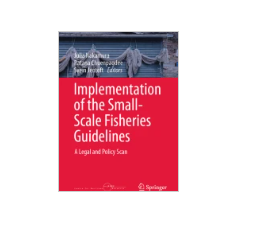A new chapter in the book Implementation of the Small-Scale Fisheries Guidelines takes a close look at how well Thailand’s laws and policies support small-scale fisheries (SSF) in line with global commitments. The SSF Guidelines, endorsed in 2014 by the Food and Agriculture Organization (FAO), are the first international instrument dedicated entirely to small-scale fisheries. They emphasize sustainability, equity, human rights, gender equality, and the participation of marginalized communities. This chapter—Policy Realignment for the Implementation of the Small-Scale Fisheries Guidelines in Thailand, authored by DFM Thailand-affiliated scholars Suvaluck Satumanatpan, Ratana Chuenpagdee alongwith Suphakarn Traesupap, Thammasak Yeemin, and Kungwan Juntarashote—asks a central question: To what extent are these principles reflected in Thailand’s legal and policy frameworks?
The findings show a mixed picture. On the one hand, Thailand has made significant progress in integrating principles of environmental and economic sustainability into its fisheries governance. The 2015 Royal Ordinance on Fishery, alongside the country’s 20-Year National Strategic Plan and 12th National Economic and Social Development Plan, explicitly supports ecosystem-based approaches and stakeholder participation. These frameworks promote long-term sustainability and demonstrate a clear alignment with the ecological aspects of the SSF Guidelines.
However, the study also reveals important gaps. Social justice principles—such as human rights and dignity, respect for cultural practices, gender equality, and nondiscrimination—are not directly addressed within Thailand’s fisheries-specific laws. While these principles can be found in other areas of national legislation, their absence from fisheries governance frameworks poses challenges for implementation. Without an integrated legal basis, these values remain peripheral to actual fisheries management, limiting the potential for truly inclusive and rights-based governance.
This lack of integration matters. As the SSF Guidelines highlight, sustainable fisheries cannot be achieved without addressing broader social and cultural dimensions. When small-scale fishers—especially women and marginalized groups—are left out of decision-making processes, and when their rights are not clearly protected by law, the goal of equitable and resilient fisheries remains out of reach. For Thailand, the next step lies in policy realignment: explicitly embedding the social principles of the SSF Guidelines into fisheries legislation, creating stronger linkages across sectors, and ensuring accountability mechanisms that work for all stakeholders.
Ultimately, the chapter suggests that Thailand is well-positioned to advance SSF governance but must deepen its commitment by grounding sustainability in both ecological and human terms. As this study reminds us, a law can be technically sound and still socially silent. Aligning policy with the full spirit of the SSF Guidelines will require continued dialogue, reform, and attention to the lived realities of small-scale fishing communities.
The chapter is available in the book, Implementation of the Small-Scale Fisheries Guidelines, published by Springer.

